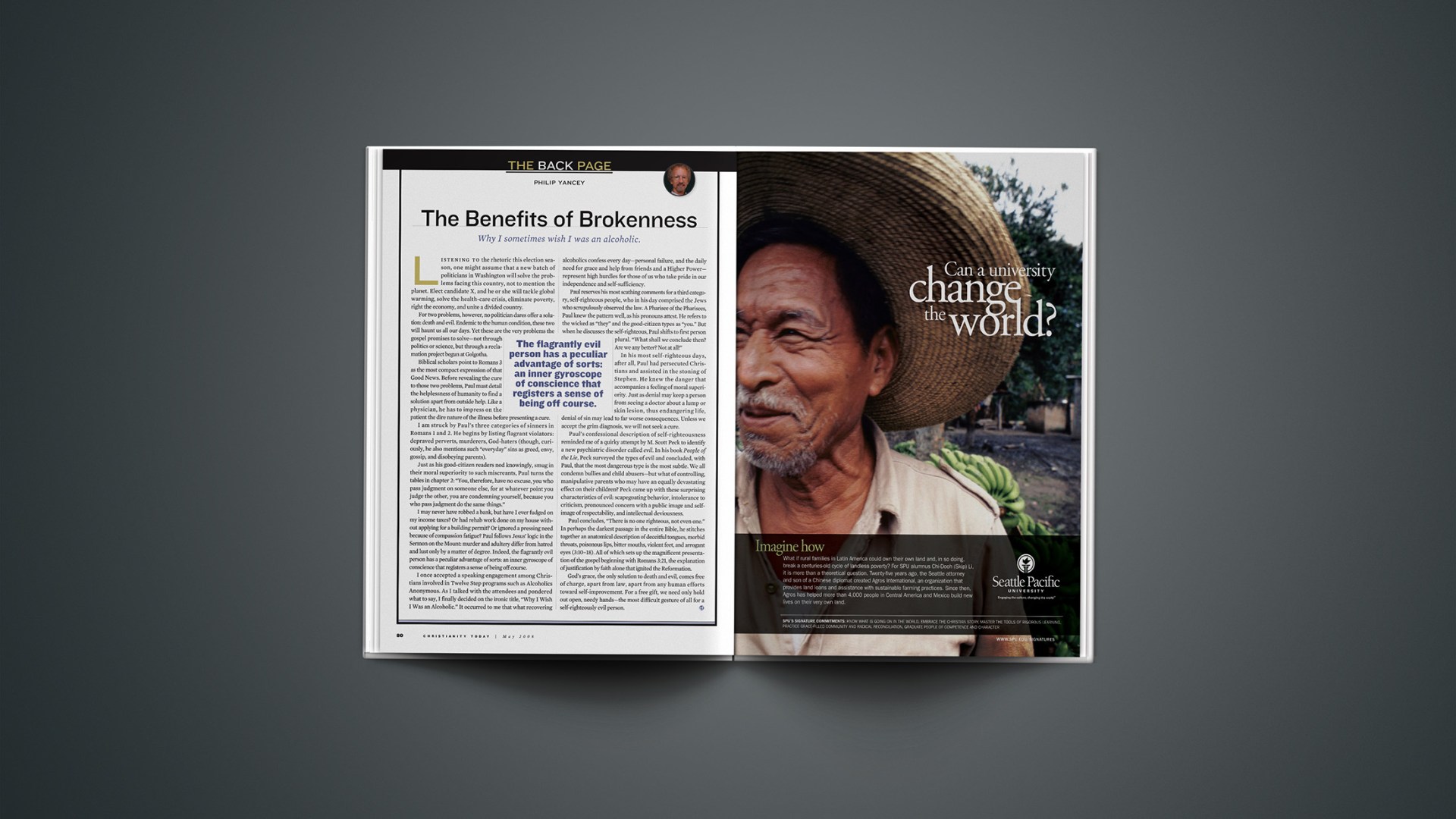Listening to the rhetoric this election season, one might assume that a new batch of politicians in Washington will solve the problems facing this country, not to mention the planet. Elect candidate X, and he or she will tackle global warming, solve the health-care crisis, eliminate poverty, right the economy, and unite a divided country.
For two problems, however, no politician dares offer a solution: death and evil. Endemic to the human condition, these two will haunt us all our days. Yet these are the very problems the gospel promises to solve—not through politics or science, but through a reclamation project begun at Golgotha.
Biblical scholars point to Romans 3 as the most compact expression of that Good News. Before revealing the cure to those two problems, Paul must detail the helplessness of humanity to find a solution apart from outside help. Like a physician, he has to impress on the patient the dire nature of the illness before presenting a cure.
I am struck by Paul's three categories of sinners in Romans 1 and 2. He begins by listing flagrant violators: depraved perverts, murderers, God-haters (though, curiously, he also mentions such "everyday" sins as greed, envy, gossip, and disobeying parents).
Just as his good-citizen readers nod knowingly, smug in their moral superiority to such miscreants, Paul turns the tables in chapter 2: "You, therefore, have no excuse, you who pass judgment on someone else, for at whatever point you judge the other, you are condemning yourself, because you who pass judgment do the same things."
I may never have robbed a bank, but have I ever fudged on my income taxes? Or had rehab work done on my house without applying for a building permit? Or ignored a pressing need because of compassion fatigue? Paul follows Jesus' logic in the Sermon on the Mount: murder and adultery differ from hatred and lust only by a matter of degree. Indeed, the flagrantly evil person has a peculiar advantage of sorts: an inner gyroscope of conscience that registers a sense of being off course.
The flagrantly evil person has a peculiar advantage of sorts: an inner gyroscope of conscience that registers a sense of being off course.
I once accepted a speaking engagement among Christians involved in Twelve Step programs such as Alcoholics Anonymous. As I talked with the attendees and pondered what to say, I finally decided on the ironic title, "Why I Wish I Was an Alcoholic." It occurred to me that what recovering alcoholics confess every day—personal failure, and the daily need for grace and help from friends and a Higher Power—represent high hurdles for those of us who take pride in our independence and self-sufficiency.
Paul reserves his most scathing comments for a third category, self-righteous people, who in his day comprised the Jews who scrupulously observed the law. A Pharisee of the Pharisees, Paul knew the pattern well, as his pronouns attest. He refers to the wicked as "they" and the good-citizen types as "you." But when he discusses the self-righteous, Paul shifts to first person plural. "What shall we conclude then? Are we any better? Not at all!"
In his most self-righteous days, after all, Paul had persecuted Christians and assisted in the stoning of Stephen. He knew the danger that accompanies a feeling of moral superiority. Just as denial may keep a person from seeing a doctor about a lump or skin lesion, thus endangering life, denial of sin may lead to far worse consequences. Unless we accept the grim diagnosis, we will not seek a cure.
Paul's confessional description of self-righteousness reminded me of a quirky attempt by M. Scott Peck to identify a new psychiatric disorder called evil. In his book People of the Lie, Peck surveyed the types of evil and concluded, with Paul, that the most dangerous type is the most subtle. We all condemn bullies and child abusers—but what of controlling, manipulative parents who may have an equally devastating effect on their children? Peck came up with these surprising characteristics of evil: scapegoating behavior, intolerance to criticism, pronounced concern with a public image and self-image of respectability, and intellectual deviousness.
Paul concludes, "There is no one righteous, not even one." In perhaps the darkest passage in the entire Bible, he stitches together an anatomical description of deceitful tongues, morbid throats, poisonous lips, bitter mouths, violent feet, and arrogant eyes (3:10–18). All of which sets up the magnificent presentation of the gospel beginning with Romans 3:21, the explanation of justification by faith alone that ignited the Reformation.
God's grace, the only solution to death and evil, comes free of charge, apart from law, apart from any human efforts toward self-improvement. For a free gift, we need only hold out open, needy hands—the most difficult gesture of all for a self-righteously evil person.
Copyright © 2008 Christianity Today. Click for reprint information.
Related elsewhere:
Yancey's previous columns are available on our site.










